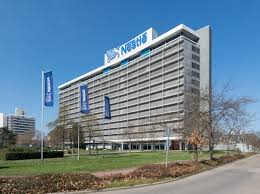Nestlé's NIDO Milk & Soya: Tackling Malnutrition and Food Insecurity in Nigeria with Innovative and Affordable Solutions
In response, NESTLÉ aims to provide essential nutrients to children and adults across Central and West Africa, promoting healthy growth and development.

- Country:
- Nigeria
Malnutrition and food insecurity pose significant challenges for many African communities, necessitating innovative solutions to address these pressing issues. The nutritional landscape across the African continent is complex, with World Bank reports indicating that a substantial number of children suffer from stunted growth and anaemia due to poor nutrition. To combat these deficiencies, food manufacturing businesses in Africa must take responsibility by offering products enriched with essential nutrients.
Meeting Nutritional Needs
Affordability plays a crucial role in the battle against malnutrition and food insecurity. Many communities face barriers to achieving a balanced diet due to the high cost of nutritious food. In response, NESTLÉ aims to provide essential nutrients to children and adults across Central and West Africa, promoting healthy growth and development.
"In 2022, Nestlé served consumers in our region with 89.5 billion servings of products fortified with at least one of the four main micronutrients we are deficient in (Iron, Iodine, Zinc, Vitamin A) to help them address micronutrient deficiency gaps, particularly iron deficiency. Our recent introduction of NIDO Milk & Soya in Nigeria is part of the company’s commitment to making better nutrition affordable and accessible across the region. This shows how affordability can be integrated into nutritional solutions, ensuring that essential nutrients are within reach for all, regardless of socioeconomic status," stated Salomé Azevedo, Business Executive Officer – Dairy, NESTLÉ Central & West Africa.
NESTLÉ's approach also emphasizes the importance of accessibility in influencing affordability. By using locally sourced soybeans for manufacturing NIDO Milk & Soya in Nigeria, the company supports local agriculture and ensures the product's availability to consumers. This localized production reduces transportation costs, thereby lowering the product's price for end consumers.
A Sustainable Solution
Sustainability is central to NESTLÉ's operations. Supporting Nigerian farmers not only provides them with a steady income but also reduces the environmental impact of dairy production. As NESTLÉ strives to meet its global target of reducing emissions by 20% by 2025, initiatives like these demonstrate that achieving nutritional goals is possible while remaining a responsible corporate citizen.
The introduction of NIDO Milk & Soya in Nigeria exemplifies how affordability and sustainability can be integrated into nutritional solutions, ensuring that essential nutrients are accessible to all, regardless of socioeconomic status. Through such initiatives, NESTLÉ continues to lead the way in addressing malnutrition and food insecurity in Africa, fostering healthier and more sustainable communities.
- READ MORE ON:
- NESTLÉ
- World Bank










